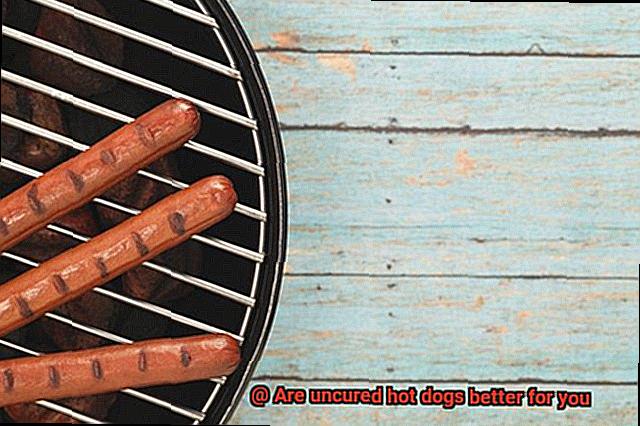Ah, the classic hot dog – a staple of American cuisine. Whether you’re grilling them up at a summer BBQ or chowing down on one at a ball game, hot dogs are a go-to choice for many. But with growing concerns about the potential health risks of consuming processed meats, it’s no surprise that people are turning to uncured hot dogs as a healthier alternative.
So what exactly is an uncured hot dog? Well, unlike their cured counterparts, these dogs are free from added nitrates and nitrites. Instead, they use natural preservatives like celery juice powder to keep them fresh. Sounds good so far, right?
But before you start stocking up on uncured franks, it’s important to understand that they aren’t necessarily a “health food.” While they may be free from some additives that have been linked to cancer and other health issues, they are still processed meats and can be high in sodium and saturated fat.
So what’s the verdict? Are uncured hot dogs better for you? It’s not a black-and-white answer. In this article, we’ll explore the pros and cons of these popular dogs and give you tips for finding a healthier option to enjoy without sacrificing flavor.
Contents
What Does “Uncured” Mean?
When it comes to hot dogs, many people are concerned about the potential health risks associated with consuming processed meats. This is where “uncured” hot dogs come in as a possible alternative, but what does this term really mean?
To understand the meaning behind “uncured,” we must first know what traditional hot dogs are made of. They are cured with sodium nitrite, a chemical used to preserve the meat and give it its characteristic pink color. However, this chemical has been linked to an increased risk of cancer, particularly colon cancer.
Uncured hot dogs, on the other hand, are not cured with sodium nitrite. Instead, natural methods such as celery juice or sea salt are used as curing agents. These natural alternatives contain nitrates that are converted into nitrites during the curing process, but at much lower levels than in traditional cured hot dogs.
So, what are the benefits of choosing uncured hot dogs? Firstly, they do not contain sodium nitrite which reduces your exposure to this potentially harmful chemical. Additionally, uncured hot dogs may also be lower in other harmful additives such as preservatives and artificial flavors.

However, it’s important to note that just because a hot dog is uncured does not necessarily mean it is healthy. Hot dogs are still processed meat and therefore high in sodium and fat. Hence they should be consumed in moderation as part of a balanced diet.
Moreover, some studies suggest that the natural nitrates found in uncured meats may also pose health risks. Therefore, it is essential to read labels carefully and make informed decisions about what we eat regardless of whether we choose traditional or uncured hot dogs.
Benefits of Choosing Uncured Hot Dogs
Many people are now turning to uncured hot dogs as a safer and healthier alternative. As an expert on this topic, let me share with you the many benefits of choosing uncured hot dogs.
Firstly, let’s talk about the absence of harmful chemicals in uncured hot dogs. Cured hot dogs contain nitrates and nitrites, which have been linked to health issues such as cancer when consumed in large amounts. Uncured hot dogs, however, are preserved using natural alternatives such as celery juice or cherry powder, making them a much safer option for your health.
Another excellent benefit of choosing uncured hot dogs is their lower sodium content. High levels of sodium in food are often linked to health issues such as high blood pressure. Cured hot dogs can be high in sodium, while uncured options tend to have lower levels of sodium, making them a healthier option for those watching their sodium intake.
Moreover, uncured hot dogs often contain higher-quality ingredients than their cured counterparts. While cured hot dogs may contain fillers and by-products, uncured options tend to use more whole cuts of meat and natural seasonings. This means that not only are they healthier for you, but they taste better too.
In addition to being better for your health, choosing uncured hot dogs can also be more environmentally conscious. The curing process used in traditional hot dogs requires significant amounts of energy and resources. Opting for uncured hot dogs that use natural preservation methods can help reduce the environmental impact of your food choices.
To sum up, the benefits of choosing uncured hot dogs are numerous and compelling. Here’s a list of reasons why you should consider making the switch:
- Free from harmful chemicals
- Lower in sodium
- Made with higher-quality ingredients
- More sustainable
Potential Health Risks of Consuming Processed Meats
These products undergo various processes, including smoking, curing, and adding preservatives, which can increase the risk of certain diseases. In fact, according to the World Health Organization (WHO), consuming processed meats can increase the risk of colorectal cancer – one of the leading causes of cancer-related deaths worldwide.
But that’s not all – processed meats are also high in sodium and nitrates, which can lead to hypertension and heart disease. Studies have shown that people who consume more processed meats are at higher risk of developing cardiovascular disease than those who don’t. Furthermore, these products tend to be high in unhealthy saturated fats, which can contribute to weight gain and obesity.
If you’re looking for a healthier option than traditional hot dogs, you may be tempted to try uncured versions. However, it’s important to note that they may still contain high levels of sodium and saturated fats. Always read the label carefully and choose hot dogs with lower levels of these unhealthy ingredients.
To protect yourself from the potential health risks associated with processed meats, it’s crucial to consume them in moderation. Opting for whole foods like lean meats, fruits, and vegetables is always a healthier choice. Here are some tips to help you make healthier choices:
- Choose leaner cuts of meat: Instead of processed meats like hot dogs, opt for leaner cuts of meat like chicken breast or turkey.
- Read labels carefully: When purchasing processed meats or other packaged foods, take a moment to read the label. Look for products with lower levels of sodium and saturated fats.
- Experiment with plant-based proteins: There are plenty of delicious plant-based proteins available that can be just as satisfying as meat-based options. Try tofu, tempeh, lentils or quinoa for a change.

Are Uncured Hot Dogs Really Better for You?
Hot dogs are a beloved American classic, but with concerns surrounding nitrates and nitrites, many people are turning to uncured hot dogs as a healthier alternative. But are they really better for you? As an expert in this field, I’ve delved into the research and have some insights to share.
Let’s start with the basics. Cured hot dogs contain nitrates and nitrites, which act as preservatives and give the meat its pink color. Uncured hot dogs, on the other hand, skip these additives and instead use natural sources of nitrates to preserve the meat.

While this may make uncured hot dogs seem like the clear winner, the reality is more complex. While they don’t contain nitrates or nitrites, they can still be high in sodium and fat, which can have negative health effects. Furthermore, some studies indicate that the natural sources of nitrates in uncured hot dogs may convert into nitrites in the body.
So what does this mean for you? Ultimately, whether uncured hot dogs are a healthier option depends on your individual health goals and preferences. If you’re worried about nitrates and nitrites, then uncured hot dogs may be a better choice for you. However, if you’re looking to limit your sodium and fat intake, both types of hot dogs should be consumed in moderation.
It’s crucial to keep in mind that while uncured hot dogs may offer some potential health benefits over cured hot dogs, they are still processed meats and should be consumed in moderation as part of a balanced diet. To help you make informed decisions about your food choices, here are some key takeaways:
- Cured hot dogs contain nitrates and nitrites which can be a concern for some people
- Uncured hot dogs use natural sources of nitrates to preserve the meat.
- Uncured hot dogs can be high in sodium and fat.
- The natural sources of nitrates in uncured hot dogs may still convert into nitrites in the body.
- Both types of hot dogs should be consumed in moderation as part of a balanced diet, as they are processed meat products.

Other Factors to Consider When Choosing Hot Dogs
Not all hot dogs are created equal, and there are many factors to consider beyond whether or not they are uncured. Let’s delve into the other factors that should be considered when choosing hot dogs.
Firstly, the type of meat used in hot dogs is crucial. Opt for hot dogs made with high-quality, lean meats like beef, turkey or chicken as they are generally considered healthier than those made with lower-quality meats or meat by-products. The quality of the meat used can significantly impact not only the flavor but also the nutritional value of the hot dog.
Added ingredients in hot dogs can also be detrimental to your health when consumed in large quantities. Corn syrup, dextrose, and sodium nitrite are common fillers in many brands of hot dogs and can be harmful if consumed excessively. To make a healthier choice, reading the ingredient label carefully and selecting hot dogs with minimal added ingredients is essential.

The way hot dogs are processed and cooked can also influence their nutritional value. Hot dogs that are smoked or grilled over an open flame may contain more potentially harmful compounds like polycyclic aromatic hydrocarbons (PAHs) than those that are boiled or steamed. Boiling or steaming is a healthier cooking method as it helps retain nutrients and reduces the risk of consuming harmful compounds.
Lastly, portion size is key when it comes to consuming hot dogs. Eating too many hot dogs can lead to consuming excess calories, sodium, and unhealthy fats which can contribute to weight gain and other health issues. Moderation is key when it comes to enjoying this beloved snack.
How to Choose a Healthy Hot Dog Option
Hot dogs are an American staple that can be enjoyed at any gathering, but with the concerns about processed meats, it’s important to choose a healthy option. Here are some key factors to consider when selecting a healthy hot dog:
High-Quality Ingredients
The first and most crucial factor to consider when choosing a healthy hot dog is the ingredients used in it. It’s best to avoid hot dogs that are packed with fillers such as soy protein or corn syrup, as well as preservatives and additives. Instead, look for those made with high-quality, minimally processed ingredients.
Opt for Uncured Hot Dogs
Another healthy option to consider is uncured hot dogs. These hot dogs are made without nitrates or nitrites, which are commonly used in traditional hot dogs to preserve their color and flavor. While there is still some debate among experts about the potential health risks associated with these compounds, choosing an uncured hot dog reduces your exposure to potentially harmful chemicals.
Read the Label Carefully
Not all uncured hot dogs are created equal, so it’s essential to read the label carefully. Look for hot dogs that are made with grass-fed beef or pasture-raised pork, as well as those that are free from artificial colors, flavors, and preservatives.
Portion Control
It’s easy to get carried away when eating hot dogs because they’re so delicious, but it’s essential to keep portion sizes in check. Hot dogs are high in sodium and saturated fat, so it’s best to enjoy them in moderation. Consider opting for smaller hot dogs or cutting larger ones in half to keep your portion sizes under control.
Choose a Healthier Bun
The bun you choose can also determine how healthy your hot dog is. Traditional white bread buns can be high in refined carbohydrates and low in nutrients. Instead, look for whole grain buns or even lettuce wraps as a healthier alternative. Top your hot dog with plenty of veggies like onions, peppers, and tomatoes for added flavor and nutrition.
What to Look for on the Label
Hot dogs are a quintessential summertime food, but with the potential health risks associated with processed meats, it’s crucial to know what to look for on the label when purchasing them. Here are five key factors to consider:
Cured vs. Uncured
The biggest difference between traditional and uncured hot dogs is the use of nitrates and nitrites in the curing process. These chemicals are known to be harmful to human health and have been linked to an increased risk of cancer. Opt for uncured hot dogs, which use natural alternatives like celery powder or sea salt.
Additives and Preservatives
Even if a hot dog is uncured, it may still contain harmful additives and preservatives. Be sure to check the ingredients list for artificial colors, flavors, or sweeteners, and choose hot dogs made with simple, whole food ingredients.
Meat Quality
The type of meat used in hot dogs can also impact their nutritional value. Look for hot dogs made from high-quality meat like grass-fed beef or organic chicken. These meats are free from antibiotics and growth hormones, making them a healthier option.
Fat Content
While uncured hot dogs may be a better option in terms of nitrates and nitrites, they can still be high in fat and calories. Opt for hot dogs that are lower in fat and sodium to make a more health-conscious choice.
Brand Reputation
Not all hot dog brands are created equal. Look for brands that are committed to producing high-quality, natural hot dogs without fillers or mechanically separated meat.
dEF_OWamRGE” >
Conclusion
In conclusion, the answer to whether uncured hot dogs are better for you is not a simple one. While they may lack certain additives that have been linked to health issues, they are still processed meats and can be high in sodium and saturated fat. However, the absence of harmful chemicals like sodium nitrite in uncured hot dogs is a significant benefit that reduces your exposure to potentially harmful substances.
Moreover, opting for uncured hot dogs may also mean avoiding other harmful additives such as preservatives and artificial flavors. But it’s important to note that reading labels carefully when choosing any type of hot dog is crucial.
When it comes to making healthier choices, whole foods like lean meats, fruits, and vegetables should always be the go-to option. If you do choose to indulge in a hot dog or two, select high-quality ingredients with minimal added fillers or mechanically separated meat.
It’s also worth considering smaller portion sizes or cutting larger hot dogs in half to keep your intake under control. This way, you can still enjoy this classic American staple without compromising your overall health and well-being.
To sum up, by being mindful of what we eat and choosing brands committed to producing natural hot dogs without fillers or artificial flavors, we can make informed decisions about our food options.






